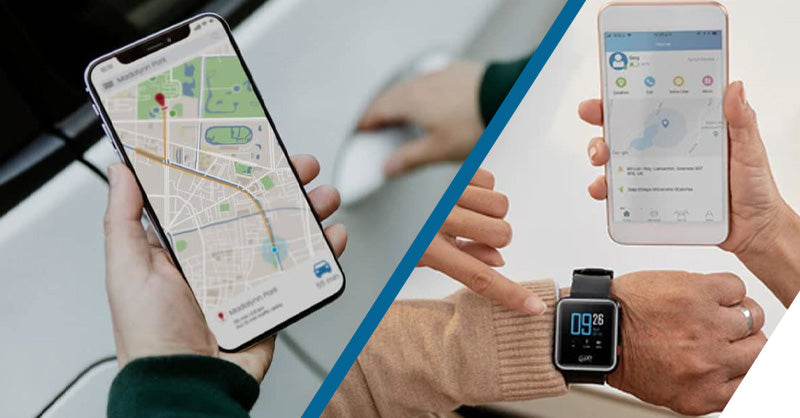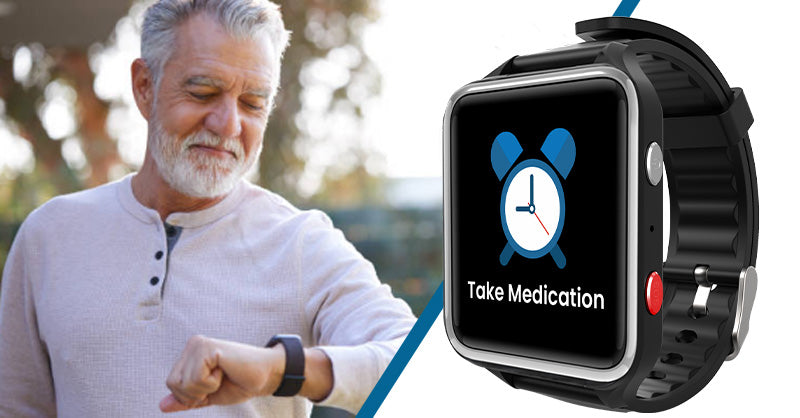Supporting caregivers is of utmost importance to ensure the well-being of elderly individuals. With the increasing demands of caregiving, technology has become a valuable ally, offering innovative solutions to address the challenges faced by caregivers.
In this blog, we will explore the significant role of technology in providing support and improving the lives of caregivers and their loved ones. We will specifically dive into the incredible advantages of the CPR Guardian fall detection watch, an advanced device designed to guarantee the safety and security of those under the care of dedicated caregivers.

Support for Caregivers: A Vital Necessity
A caregiver is a demanding responsibility, often requiring round-the-clock attention and vigilance. Whether assisting with daily activities, ensuring medication adherence, or monitoring safety, caregivers play an invaluable role in the lives of those they care for.
However, the challenges they face can be physically and emotionally overwhelming. This is where technology steps in, offering a lifeline of support to alleviate some of the burdens caregivers experience.
Physical and Emotional Well-being
Caregiving can take a toll on a person's physical and emotional health. Supporting caregivers is essential to prevent burnout, stress, and exhaustion. Access to resources and assistance can help them maintain their well-being, ensuring they can continue providing care effectively.
Enhanced Quality of Care
Caregivers can provide better care to their loved ones when they receive support. Support can come through training, respite care, or access to information and tools that improve caregiving techniques and outcomes.
Reduced Caregiver Burden
Caregivers often carry a significant burden in terms of responsibilities and tasks. Adequate support can help distribute these responsibilities, making the caregiving role more manageable. This, in turn, reduces the stress and burden on caregivers.
Maintaining Independence
Caregivers help individuals maintain their independence and dignity. With support, caregivers can assist without taking away the autonomy of those they care for. This allows care recipients to lead more fulfilling lives.
Social and Financial Stability
Caregivers often face financial and social challenges due to their caregiving responsibilities. Support can include financial aid, counselling, and community programs that address these issues, ensuring caregivers can maintain their stability while providing care.

Technology: Enhancing Caregiving in the Digital Era
In the fast-paced digital era, technology has emerged as a powerful ally for caregivers, revolutionising how they provide support and care to their loved ones. Whether caring for an aging family member, a child with special needs, or someone recovering from illness or surgery, caregivers face new challenges and opportunities thanks to technological advancements.
Remote Monitoring
Caregivers can harness the capabilities of wearable devices, smart sensors, and health apps to maintain a vigilant watch over the health and well-being of their loved ones, even from a distance. This real-time data stream empowers caregivers to swiftly identify deviations from baseline health metrics, enabling timely interventions and offering a profound sense of reassurance and peace of mind in their caregiving role.
Medication Management
Technology lends caregivers a helping hand in the meticulous medication management task. Through reminders, automated pill dispensers, and mobile applications, caregivers can diligently oversee that their loved ones adhere to their prescribed medication regimens. These digital tools ensure that medications are administered accurately and on schedule, ultimately promoting better health outcomes.
Telehealth Services
In an era of digital transformation, telemedicine, and virtual doctor visits have become increasingly accessible, providing caregivers with a convenient and efficient means of consulting healthcare professionals. This digital healthcare avenue eliminates the need for physically attending medical appointments, allowing caregivers to promptly address medical concerns and access expert guidance from the comfort of their homes.
Supportive Online Communities
Caregivers can connect with others who share similar caregiving responsibilities through online support groups and forums. Within these virtual communities, caregivers can openly share their experiences, exchange valuable advice, and extend and receive emotional support. Such digital camaraderie helps alleviate the isolation that caregivers sometimes endure while fostering a network of understanding peers.

Assistive Devices
Integrating smart home technology and assistive devices, such as voice-activated assistants, intelligent thermostats, and home automation systems, enhances the safety and comfort of care recipients. These technologically advanced solutions can automate routine tasks, maintain optimal environmental conditions, and offer invaluable assistance, promoting greater independence for care recipients and lightening the caregiving load.
Digital Health Records
Electronic health records empower caregivers to maintain comprehensive digital medical histories for their loved ones. These digital records are not only easily accessible but also highly shareable with healthcare providers, ensuring a more coordinated and informed approach to healthcare delivery, particularly in emergencies or when consulting specialists. These digital health records are invaluable resources.
Communication Tools
Video calls and messaging apps serve as a lifeline for caregivers, enabling them to maintain close and meaningful contact with their loved ones, regardless of geographical distances. By facilitating frequent and enriching interactions, these digital communication tools mitigate feelings of isolation experienced by caregivers and care recipients while nurturing and strengthening emotional connections.
Education and Resources
Caregivers can tap into a wealth of online resources and educational platforms designed to equip them with valuable information, comprehensive training, and expert guidance across various facets of caregiving. These digital resources empower caregivers with the knowledge and skills to make informed decisions and provide high-quality care.
Care Coordination Apps
Specialised apps tailored for care coordination streamline the management of caregiving tasks, allowing caregivers to effectively collaborate with multiple individuals involved in caring for their loved ones. By ensuring that everyone remains synchronised and informed regarding the care plan, these digital tools enhance overall caregiving efficiency and reduce the potential for miscommunication.
Respite Care Services
On-demand respite care services, often accessible through user-friendly apps, offer caregivers a vital reprieve from their caregiving responsibilities when needed. These services provide trained professionals who step in to care for their loved ones, allowing caregivers to temporarily recharge and prevent caregiver burnout while ensuring that their care recipients continue to receive the high-quality care they require.

Conclusion
The role of technology in providing support for caregivers cannot be overstated. From fall detection watches to smart home systems and online communities, technology offers many solutions that empower caregivers and enhance the lives of those they care for.
The CPR Guardian fall detection watch, with its advanced features and seamless functionality, exemplifies the transformative impact of technology in caregiving. As we continue to embrace technological innovations, it is crucial to recognise and appreciate their role in enabling caregivers to provide the best possible care while ensuring the safety and well-being of their loved ones.
Please contact us if you need assistance.


